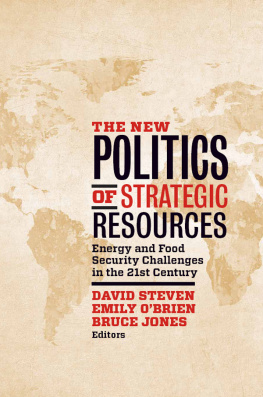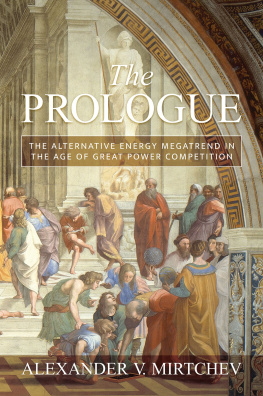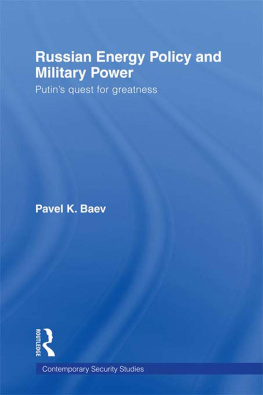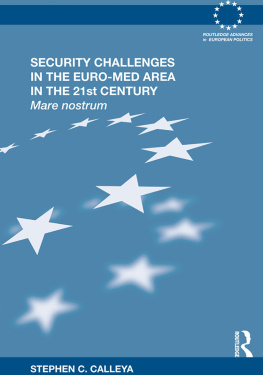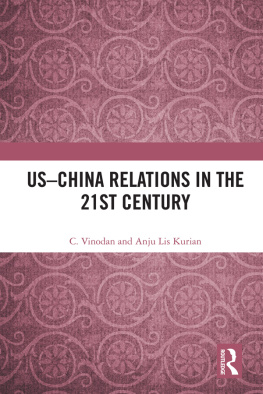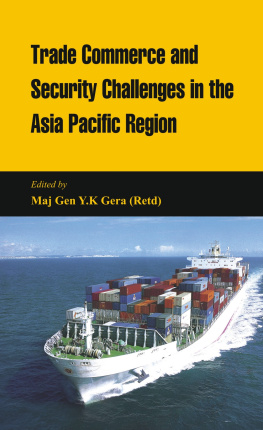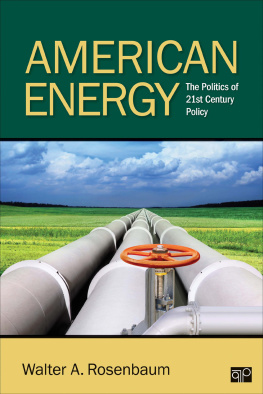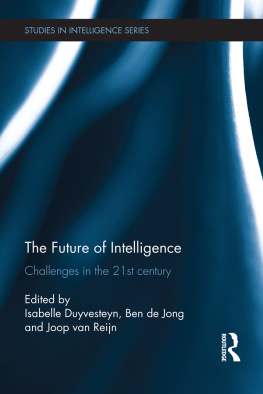THE NEW POLITICS OF STRATEGIC RESOURCES
Energy and Food Security
Challenges in the 21st Century
DAVID STEVEN
EMILY OBRIEN
BRUCE JONES
Editors
BROOKINGS INSTITUTION PRESS
Washington, D.C.
Copyright 2015
THE BROOKINGS INSTITUTION
1775 Massachusetts Avenue, N.W., Washington, DC 20036
www.brookings.edu
All rights reserved. No part of this publication may be reproduced or transmitted in any form or by any means without permission in writing from the Brookings Institution Press.
The Brookings Institution is a private nonprofit organization devoted to research, education, and publication on important issues of domestic and foreign policy. Its principal purpose is to bring the highest quality independent research and analysis to bear on current and emerging policy problems. Interpretations or conclusions in Brookings publications should be understood to be solely those of the authors.
Library of Congress Cataloging-in-Publication data
The new politics of strategic resources : energy and food security challenges in the 21st century / David Steven, Emily O'Brien, and Bruce Jones, editors. 1st Edition.
pages cm
Includes bibliographical references and index.
Summary: Examines the political dimensions of strategic resource challenges at the domestic and international levels, including energy and food markets, water scarcity, and the roles of various actors such as the U.S., China, India, Russia, Saudi Arabia, and othersProvided by publisher.
ISBN 978-0-8157-2533-6 (pbk. : alk. paper)ISBN 978-0-8157-2534-3 (ebook) 1. Energy policy. 2. Food security. 3. Natural resourcesManagement. I. Steven, David, 1968 editor.
HD9502.A2N493 2014
333.7dc23 2014028556
Digital printing
Typeset in Adobe Garamond
Composition by Cynthia Stock
Silver Spring, Maryland
Acknowledgments
We wish to thank the many who provided strategic help and support along the way, enabling the publication of this edited volume, as well as its companion, The Risk Pivot: Great Powers, International Security, and the Energy Revolution, written by two of the editors, Bruce Jones and David Steven.
Both volumes have been made possible by the John T. and Catherine D. MacArthur Foundation, which first underwrote a key research project at Brookings investigating the geopolitics of resource scarcity. The findings of that program became the principal source of research for this book. The Skoll Global Threats Fund supported a cognate project exploring the governance of global issuesof which energy and climate are emerging as critical exemplars of the challenges facing world leaders today. We are very grateful for the support received from both organizations.
New York University's Abu Dhabi Institute also hosted a conference in November 2013 during which the findings reflected here were reviewed with scholars from the United States, Europe, and the emerging powers, as well as with officials from the United Nations, International Renewable Energy Agency, and other key institutions. We appreciate all participants collaboration.
In addition, Shiri Avnery and Farah Hegazi of the NYU Center on International Cooperation, Matthew Kent and Jane Frewer of River Path, and Rob Keane and Katherine Elgin of the Brookings Institution all provided research efforts from which we've drawn.
A particular thanks to our contributors for the quality of their contributions and the endurance of their patience with usedited volumes are a long and laborious process, and we appreciate their engagement and good humor throughout.
This work on the geopolitics of resource scarcity project was one part of a broader program at Brookings, the Project on International Order and Strategy.
1
Introduction: Energy Policy on the Edge
BRUCE JONES AND DAVID STEVEN
This book is about the political economy of energy. There are few more consequential topics for understanding today's global economy, for global development, or the very well-being of humankind.
Energy isn't always thought of as being essential to the fabric of the global economy, or to developmentbut it should be. This can be dramatized by juxtaposing three simple facts.
Energy goods account for almost one out of every five dollars traded in today's global economy. That makes it one of the largest sectors in contemporary globalization. Only finance is in the same league in terms of shares of global economy activity.
Despite the huge volumes of energy being produced and consumed, more is needed: 1.3 billion people live without access to modern energy. This is not a phenomenon primarily of the world's poorest states, but of its most dynamics onesthere are upward of 300 million without access to modern energy in India alone, a state otherwise poised to join the ranks of the top powers. Securing new supplies for the world's energy insecure is going to be among the most critical tasks of development in the coming decades.
Yet, we're already burning more fossil fuels than our climate can handle. The drive to expand energy access and security will complicate and be complicated by the mounting fight and fright over global warming. The vast majority of the world's scientists agree that to stabilize the global climate at a less than 2C rise in average global temperatures requires keeping the quantity of carbon and other greenhouse gases in the atmosphere at around 450 parts per million. Right now, we're at 403 ppm and we're on track to hit 650 ppmand that's if governments meet the climate targets they agreed to in Copenhagen in 2009. Growing demand for energy by the world's rising states and growing middle classes puts that target comprehensively out of reach even if we see something approaching the full-scale decarbonization of the economy in the Westa near-impossible challenge.
The long and the short of it is, energy is emerging as a defining feature of globalization, of global development, and, of course, of climate change. Indeed, if the first phase of modern globalization was about its geographical spread (what's been called extensive globalization), and the second was about the deepening of economic integration between existing markets (intensive globalization), there's a case for arguing that the next phase is going to be heavily about energyits acquisition, transportation, and, most importantly, the debate over whether to constrain its use. Call it the phase of sustainable globalization.
It's also reshaping geopolitics. In a book published simultaneously with this one, Bruce Jones and David Steven examine the geopolitical consequences of the changing global energy landscape. The Risk Pivot: Great Powers, International Security, and the Energy Revolution focuses on the way energy is amplifying three already complicated problems: geopolitical competition between the great powers; the struggle over global development in the new middle powers, as well as in fragile states; and global climate change negotiations. The book highlights the critical choices facing the top powers. As we see it, these are three: whether to allow energy to continue to be a source of geopolitical tension for globalization; whether to choose deliberately to use energy as a source of additional tension, that is, to use energy as a political and economic weapon against one another; or whether to forge a governance approach, that is, to build the relationships, rules, and mechanisms to limit the way energy amplifies tensions and, by contrast, to find areasand important ones do existwhere energy is a source of win-win outcomes and thus of potential cooperation.

